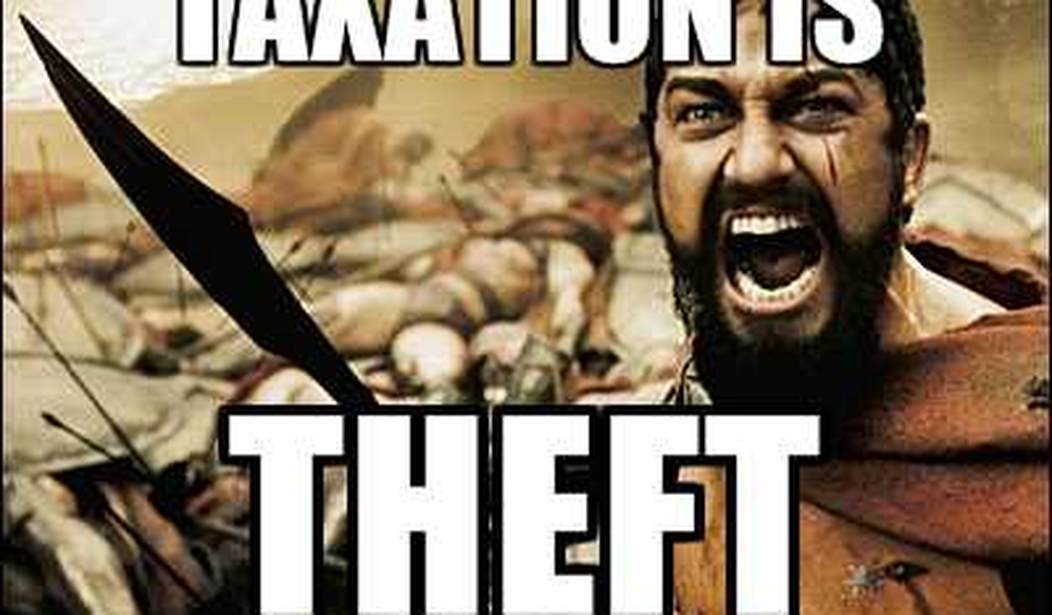Taxation is theft. If you have many friends ranging from tea party to anarchist, you have likely seen one or more memes in your social media feed with that message. Some prove more clever than others. Many are just obnoxious, like the one crafted for Easter that used the crosses of Calvary as the t’s in “taxation is theft.” For reasons not immediately clear, these posts have spiked in popularity.
The underlying message proves true. Taxes are collected under coercion, rather than earned through trade or persuasion. If you fail to pay your taxes, men with guns will eventually be sent to arrest you. If you resist that arrest, they may legally use those guns to shoot and kill you. It’s something we don’t typically pause to think about in our day-to-day lives. When we do, we often discount the coercive nature of taxation with rationalizations about “the greater good” or “public interest.” Memes stating that “taxation is theft” thus confront us with a provocative truth.
That said, now what? You’ve got my attention with your meme. You’ve convinced me that taxation is theft. Now what am I supposed to do?
This is the problem with much of what passes for activism among the insurgent right. Too much of it amounts to little more than snark with no practical application or call to action. What’s the plan? Are we going to abolish taxes? Are we going to disband the state? Let’s say we get a nice little coalition united around those goals. What then? Is there a clear path from here to there, or are we going to Tyler Durden this thing?
Short of violent revolution, which would undoubtedly result in consequences far worse than taxation, the path to less government involves incremental change. But a sentiment like “taxation is theft” does not allow for incremental change. It sets one improbable goal and offers no stepping stones to reach it.
That’s the fundamental flaw of anarchism, the political ideology which claims “taxation is theft” as its motto. It addresses the faults in a solution without addressing the original problem. Sure, if there was no state to tax you, you could keep all your money, but only until the first gang of thugs came along to take it from you. Would that truly be better? Anarchism seeks to liberate us from coercive taxation, but would leave us enslaved to any other random form of coercion.
Anarchists fantasize about a utopia in much the same way that communists do, holding up an ideal that would work wonderfully if it weren’t for our pesky human nature. Both anarchism and communism require a population of one mind about the best way to live. That’s never going to happen.
Ayn Rand presented a more plausible solution when she advocated for government funded through contribution. But sustaining that would require a majority population that largely understood and greatly valued individual rights, who first reached consensus regarding government’s limited role, then agreed to fund it. We’re not there yet.
Most people know implicitly that some amount of government is required to secure our rights. The question becomes how best to secure those rights, how to provide the highest degree of liberty utilizing a minimum amount of coercion. Until we achieve a society capable of better, some degree of taxation must be endured to provide for proper government.
Perhaps a better statement for building memes upon would be “government is force.” That at least gives us somewhere to go. Once we establish that government is force, the question becomes under what circumstances may force be morally employed. That’s a question with a straightforward answer that has practical applications. Force may be morally used only in response to the initiation of force by others, in self-defense, in retaliation, in an effort to claim restitution for harm. That is government’s proper role. Taxes may be theft in the purest sense of the term. But if taxpayer dollars are utilized to protect individual rights, the real-world effect will be a maximum amount of liberty and a minimum level of coercion. That’s a worthy goal, and wholly attainable.
We live in an imperfect world populated by imperfect people. There will never be a point at which we fully eliminate suffering, harm, and coercion. We can aim for utopia, but will only get close to it if we accept that we can never actually reach it. Reaching beyond our grasp will invite greater evils than the ones we aim to overcome.













Join the conversation as a VIP Member